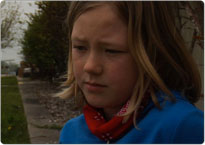When the Junkers adopted Brianna and her younger brother, the two children had been living in a meth lab with a known pedophile, going door to door in their neighbourhood begging for food. While the Junkers dreamt of giving these two lost kids a good home, the trauma of their past was impossible to shake. Brianna, whom the Junkers would call Faith, suffered from Post-Traumatic Stress Disorder and Reactive Attachment Disorder as a result of the neglect and abuse she had experienced for the first six years of her life.
The Junkers were at a loss until they attended a camp for families dealing with similar situations, and it turned their lives around. The Junkers decided to host their own camp, and make a film about the experience with co-directors Jorge Torres-Torres and Jason Banker, produced by Adrien Grenier. The film is a raw look at the pain inside these children, and the ways they try to express it, from violent threats and actions to uncontrollable fits of rage. It can be difficult, even worrying, to watch, especially considering how young many of the children are. But the love these families have for one another is inspiring, and the struggles of these kids will make anyone to whom love comes easily feel incredibly grateful. We spoke with Sudela-Junker about the experience making the film.
She Does The City: What inspired you to make the film?
Tiffany Sudela-Junker: We felt isolated. Even our most supportive friends could not understand what we were going through. When we went to camp, we didn’t expect to be understood there either. But we found the support we’d been looking for and it inspired us. People do not know how to support a family trying to help a child heal from trauma. They give them praise for taking it on, they admire them, but I don’t think people understand what it takes to help a child recover 24 hours a day. It’s emotionally, physically, mentally exhausting. These kids are in the fight of their lives, their families are barely surviving, we knew the only way to shed light on this struggle was to be willing to share it, even though we knew getting families in pain to open up and be heard would be hard. Any person who overcomes a hard beginning deserves to be honored, I felt strongly that standing up and being heard would help my child heal and give her an opportunity to help others.
SDTC: What struck you most about Faith?
T S-J: [My husband] J and I were chosen for Faith and Jonah because we were open to having and keeping a relationship with the birth-family. That was important to their grandparents, who were caring for them and who we met first. They were adorable and I could tell immediately that Faith was very bright and precocious….she was just my kind of kid. It’s weird to say this but we “just knew,” it was really sort of a love at first sight thing.
SDTC: What was the most difficult moment during the filming process?
T S-J: The first day of camp. It took a lot to gain the trust other families. Nobody knew what to expect and the film-makers had to be so sensitive to the therapeutic element of camp, and not disturbing that in any way, that it took a while to gain rapport. It was already a very intense situation. Adding camera just took the intensity up to a whole other level. We found our groove though, Jason and Jorge were amazing, and by the end of day one everyone felt completely comfortable with them. I’m not sure anyone can understand how amazing that is really. It is a testament to them both as filmmakers and as people.
SDTC: What do you hope people take away from the film?
T S-J: We hope the film will put people in touch with the emotional part of this journey and the fact that those going through it need help, it’s a call to action. We also hope to inspire an appreciation for what it takes for a child to decide to create a healthy life for themselves when pain is all they know.
Wed, May 2nd, 7:15 pm, The Royal Cinema. Buy tickets.
Thu, May 3rd, 1:30 pm, Cumberland 3. Buy tickets.
Sat, May 5th, 6:30 pm, The ROM Theatre. Buy tickets.
~ Haley Cullingham



 Follow Us On Instagram
Follow Us On Instagram
